- Home
- Jennifer A. Nielsen
Resistance Page 18
Resistance Read online
Page 18
“We should get as much as we can bring in,” I said. “Once we’re in, that’s probably our last stop.”
Ever.
She looked over at me and nodded. A gesture given with finality because there was nothing more to say. We both knew what we were walking into.
Esther hid with the bags inside a bathroom stall of a small restaurant. Hopefully, that would keep her safe while I took the rest of our money to buy provisions. There were only two things I wanted: food and medical supplies. Because of rations, I couldn’t buy much of either without raising suspicions, but with enough trips to various markets and a small stack of forged ration cards, I gradually obtained a good stockpile. I imagined the ghetto had very few bandages or bottles of aspirin and rubbing alcohol. For food, I concentrated on what could be eaten quickly, assuming that a fight was coming and no one would have time to prepare a meal. I bought dried meats that I hoped were kosher, although I could hardly ask about them, pierogis, and even some pastries that might raise the spirits of fighters who could only see a bleak future. A jelly-filled paczki might go a long way toward reminding them that life still offered good things.
Or I hoped it would. And not because life was easy or happiness was guaranteed, or because we had any chance of waking up to find all our problems were over. No, life offered good things because life itself is good. And whether I had days left, or months, or years, I wanted to make the most of every moment.
And with that thought, I couldn’t return to Esther fast enough, ready to join the fight.
Together, we stepped out of the restaurant, but almost instantly she froze, her eyes locked on a woman ahead of us. The woman became equally still, her face a virtual beacon of fear. My first thought was a question, wondering why these two should be wary of each other, as strangers.
But that was my answer. They weren’t strangers at all.
The woman must be Jewish, attempting to disguise herself as Polish, much like I did. But she clearly was not prepared to see someone she knew, nor was Esther.
Their standoff was already drawing attention our way. People even moved around them, no doubt whispering to one another about this uneasy exchange.
The woman broke from her trance with a start and marched over to Esther with her hands on her hips. “How dare you?” she hissed. “How dare you show your face back here? Your parents got what they deserved. So will you!”
I put my body between the woman and Esther, keeping my eyes fierce and locked on the woman’s face. “Walk away now, or we’re all dead.” I refused to look away until she finally took a step back.
But she added, “You wouldn’t defend her if you knew the truth.”
“I’ll defend her until my last breath because she’s my friend. Now go.”
The woman smiled and stepped back. “Stick with her, and your last breath will come soon enough.”
Once I was sure the woman was gone, I turned and pushed Esther into an alley behind the restaurant. Tears welled in her eyes, but I had no sympathy this time. “You’re from Warsaw?” I tried to keep my voice low, but anger seeped through every syllable. “Why didn’t you tell me?”
“I was going to … I didn’t know how.”
“That was a fine way to find out! Who was that woman?”
“What did she mean, that my parents got what they deserved? Are they dead, then?”
“Who is she, Esther? Who are your parents?”
Esther looked back, then tilted her head toward the right. “About five blocks that direction was my home, where I grew up. It was lost in the Blitzkrieg, on the same day my brother was killed. Suddenly, it was just me and my parents. We had nothing else in the world.”
My voice softened. “I can’t imagine what that felt like.”
She offered a grim smile. “Yes, you can. I’m not the only one anything has happened to, remember? My father was offered a position on the Judenrat.” She quickly added, “I know you don’t trust any of them, Chaya, and I understand why, but my father believed it was the only chance we had to survive.”
I did understand that much. “If he’s Judenrat, shouldn’t you have been protected?”
“We were, until the Aktion last summer. The head of the Judenrat killed himself rather than provide the Germans with a list for deportations. The responsibility of creating the lists passed to my father, but he made two agreements first. The first was with ZOB. My father would keep resistance members off the list if they agreed to smuggle me out of the ghetto.”
“That’s how you met Dolek,” I said. “Then he brought you to Krakow.”
“Yes. I asked to join the resistance, to thank the people who helped me escape the ghetto. And to make up for the names my father put on the list instead. Such as the family of that woman we just saw.” Her voice broke. “I’m only alive because … because …”
“Because that woman’s family was on the list.” A beat passed. Then, “Your father made two bargains.”
“The second was made with the Germans. He refused to provide names for a death camp, so they agreed to deport the people to another ghetto, to help with the overcrowding here.”
“Lodz.” I barely breathed out the word, then shook my head in disbelief. “That’s why you apologized after we left. We never had orders to go there. You took us to Lodz to see if the Germans had kept their promise. You decided we’d go there. Esther, you lied to me!”
“I had to know! A few days ago, you told me how much worse Yitzchak’s disappearance is because you’ll never know what happened to him. That’s how I felt, only instead of one person, it was thousands.”
“And how many more died in the Aktion we started because you wanted to settle your conscience?”
“I didn’t know that would happen, and I sincerely hoped we could help whoever was there. I’m sorry, Chaya.”
“What about here? Did we ever have orders to come here?”
“Yes, we do, I swear it!”
I turned away, furious and failing in my attempts not to let it show.
Barely under her breath, she whispered, “I think my parents are dead.”
Her lower lip quivered, but she couldn’t cry here. Our hushed conversation was already getting second looks from passersby. I was angry with her, and heartbroken for her, and completely unsure of what to do now except to get us both off the streets. I hoisted my bag again, keeping my tone firm. “Can you get us into the ghetto?”
She nodded, brushing away a single escaped tear. “I can.”
“Then nothing else matters right now. Get us inside.”
The ghetto was located near the center of Warsaw close to the Vistula River, but with no access to the water. It encompassed a three-and-a-half-kilometer area with a footbridge connecting two halves, allowing a streetcar to pass underneath.
The ghetto’s brick walls were three meters tall and lined on top with barbed wire. As we approached, I saw where holes might’ve once been dug beneath the walls for children to escape and return with their smuggled food. These children knew which market owners left old fruit in an easily stolen pile behind their shops, or which housewives pretended to cool bread beneath an unwatched windowsill. But these holes were filled now and the bricks replaced.
“What if your way in doesn’t exist anymore?” I asked Esther.
“It does. At about the time I left, they began shrinking the ghetto boundaries. Some of the former area was given back to the Poles, for their occupation. The rest is supposed to be abandoned, uninhabited.”
“What do you mean, ‘supposed to be’?”
“They’re considered the wild areas. No one is allowed there, but there are plenty of places for people to hide.”
“How do they survive?”
She shrugged. “How do any of us survive these days? We should be able to get into the wild after it’s dark, then make our way through the buildings until we cross into the ghetto.”
I didn’t understand how that was possible, but she was asking me to trust her. Given what I’d ju
st learned about her history, I knew how foolhardy that was, but what other choice did I have?
“Tonight,” she said. “We go in tonight. For the last time.”
February 22, 1943
Warsaw Ghetto
We entered the wild shortly after midnight, sneaking in near the cemeteries, a detail I noticed with a particularly grim scowl. German patrols still crossed our path, but they were on vehicles, making it easy to time our entrance.
As awful as it ever was to enter an overcrowded ghetto full of starvation and disease, the wild was somehow worse. Building after building stood vacant—or at least, that was the impression those in hiding wanted to give. Scavenged pieces of luggage lay open on the streets, as those who were herded from here had been forced to leave their belongings behind. Nothing edible remained, and certainly nothing with any monetary value. But I saw a photo album lying open on the snow, the pictures blurred from the moisture, and nearby a single hand-knitted baby’s bootie. These were someone’s treasures, someone’s memories. Stories of someone’s life.
Once.
It was haunted here. Anyone could feel that. Death permeated the night air, carried on the wind like a vulture’s hiss. I smelled the blood, bitter to my senses, and seemed to hear echoes of despair from those who’d discovered their fallen loved ones on these streets.
Esther gestured that we should move quietly, not out of concern for the soldiers, but because she didn’t want to alarm anyone hiding here. Perhaps she remembered the way the women attacked her in Lodz for those potatoes.
Eventually, Esther and I would have to discuss her deception. I understood why she had wanted to know what had happened to those thousands of people, many of whom must have been her friends or acquaintances. But she couldn’t ask for my trust one moment and betray it the next.
And she’d need time to properly mourn for her family. But not yet. Not while we needed to focus on getting through the wild.
We crept up a rickety staircase to the second floor of a building. Even in the darkness of night, Esther moved with confidence, secure in each step. From her lithe movements, I was sure she’d been here before, likely had traveled this very hallway before. For all I knew, this apartment was once hers, or had belonged to a close friend.
She raised a finger to her lips again and then pointed to a closed door on our left. Listening carefully, I could hear movement inside the room. Someone was awake and aware of our presence, probably slipping inside a hidden compartment, terrified that we might be soldiers or looters or thieves. I wanted to tell them not to be afraid, that we were friends. But I didn’t. I couldn’t.
Even more, I wanted to offer them some of the food Esther and I were carrying. We had enough to provide the people here in the wild another week or two of life. But our supplies had to get to the resistance members. Their lives were no more valuable, but their fight was.
At the far end of the building, Esther knelt beside a framed and broken mirror hung on the wall. It looked nailed down, but the lower nails easily pulled free from the plaster walls, revealing a tunnel. Esther put her bag in first and scooted in after it. I followed, though I had to crawl on my elbows to fit through the small space, especially with the German pack still on my back and pushing the medical bag ahead of me. When the mirror rolled back into place behind us, the tunnel went black. I closed my eyes and listened for Esther ahead. For the first time since we met, she consoled me, quietly whispering that everything was okay.
We emerged through a closet in a new apartment, and probably in an entirely new building, one that was closer to the new ghetto boundaries. Obviously, these aboveground passages had been designed to move people from one part of the ghetto to another without having to go onto the street. It was brilliant. If I ever returned to courier work, I’d tell other ghettos about this too.
Esther carefully peeked out a cracked open door of this apartment before declaring it safe to leave. Then we repeated the process from before, making the long walk to the far end of the building, entering this time through a hole that was disguised as a heating vent and exiting in a new building through the cupboard beneath a kitchen sink.
Yet this time, as we tiptoed through the dark apartment, I tripped and fell to my hands and knees. My breath caught in my throat when the object I’d tripped over sat up and let out a small cry.
Not an object at all: It was a child, a little girl with wide eyes and dark hair in need of combing. She grabbed her blanket and backed into the corner, clearly terrified and looking like she was about to scream.
We couldn’t have that.
“It’s all right,” Esther quietly said, then slowly crouched low to the girl’s level. She offered a smile and smoothed her hand over the girl’s hair. “We’re your friends.”
I followed her lead, speaking as softly and kindly as I would’ve spoken to my own sister. “Are you hungry?” For her, I could spare a little food. I gave her some of the German army rations we’d taken from the tank, and an entire loaf of bread. If she was careful, it would last for some time. There was one more gift I wanted to offer her: the rest of the chocolate bar Esther and I had opened. I held it out and she cautiously took it, but her eyes flicked almost nonstop between me, Esther, and the chocolate.
“Shh,” Esther said. “Be safe.”
The girl remained in place until we left, though as soon as we closed the apartment door behind her, I heard the foil of the chocolate bar being torn off. I doubted she’d eat it all right away, maybe allow herself only a tiny piece. But I pictured a smile spreading across her face, and that warmed me.
We crossed from this apartment safely into another, where Esther turned and said, “This is our last crossing. After this next tunnel, we’ll be inside the ghetto.”
It was so simple, I almost couldn’t believe it. “Why hasn’t everyone left this way?” I knew the question sounded naïve, especially given all I’d seen as a courier, but I wanted to understand. It was one thing to have to be smuggled out of a ghetto. That could be expensive and required the help of a smuggler. But here, the people could get themselves out. Why would they stay?
Esther shrugged. “These tunnels were built by the resistance.”
“Did your father know about them? Does the Judenrat know? Because if they did, then the Germans know too.”
“I was involved with smuggling before I left,” she said. “My father didn’t know that, nor about these tunnels. Obviously, the resistance had to keep this secret. Otherwise, word would spread, eventually someone would be caught, and then these passages would be shut down. But even most of those who do know about the tunnels haven’t used them for escape. They’d need friends on the outside to have any hope of survival, and as you already know, the Jews have a short supply of friends in Poland these days.”
Yes, that I knew far too well.
By now, we had entered the final tunnel, a hole drilled through the shared brick wall of the neighboring building and hidden by a chest of drawers. We exited through a hole at the back of a mostly empty wardrobe, and a deep sigh escaped from me. It was a relief to be out of the wild.
Or perhaps it was a sigh of worry, because we were officially inside the Warsaw Ghetto. And the clock was ticking.
Esther suggested we wait until daylight before going out in the open. “I’m sure the people here are extra watchful for strangers,” she said as we sat in a corner of the abandoned room. “You’re a stranger, and I’m—”
“—the daughter of the Judenrat.” I bundled my coat around me, blocking her out.
“Chaya, I said I’m—”
“Good night, Esther.” I wasn’t ready to talk about that, not yet.
When morning broke a few hours later, we slipped out onto the streets. In appearance, it was similar to other ghettos, a place where seven people had to share every available room. The problem of such severe overcrowding had taken its toll on the streets and buildings. Most of the trees had been felled for their wood, and the ghetto walls were a constant reminder that
this place was, and always had been, a kind of prison.
Despite all that, I was immediately struck by how different the people of this ghetto were from any other I’d seen so far.
No one wandered here. No one sat idly by, watching the world turn. Those who were on the streets moved with purpose. They knew what was coming, the same as I did. They were preparing.
Within only a few blocks, our presence was noticed. A hand tapped me on the shoulder and the voice was sharp, accusatory. “I don’t know you girls.”
I turned to see a square-built man in his early thirties with a distinct scar on the side of his face. It looked recent. Forcing myself not to stare at it, I gestured at Esther. “This is Esther Karolinski, and I’m Chaya Lindner. We’re with Akiva, from Krakow. We were sent here to help.”
“Hmm.” His expression remained cautious as he looked me over first; then his eyes rested longer on Esther and her shoulders hunched. She was looking anywhere but at him. I wondered how this man was affected by her father’s lists.
He nodded at our bags. “What do you have there?”
We opened them for his inspection. He checked carefully through everything before looking up at us again, now with a wide smile on his face.
“Krakow?” he asked. “We heard the resistance there was crushed.”
“Akiva is broken, that’s true,” I replied. “But some of us remain, and we want to fight here.”
His eyes returned to Esther. He must know who she was, or her father. He was suspicious of her, and I worried he might not allow us to remain.
“My name is Tamir,” he said. “I fight for ZOB under the direction of—”
“Mordecai Anielewicz,” Esther finished. “So will we, if you’ll have us.”
“Will we have you?” Tamir laughed, a surprisingly booming laugh. “My dear, we would take a blind man with two minutes to live if he knew which way to point his weapon! Come with me.”
And so our morning began. This was one of the rare times when I was able to receive thanks for what I’d brought into the ghetto and I wasn’t prepared for the hugs and offerings of gratitude. We handed over everything, with one exception: my gun. I knew I’d need it, and I’d worked too hard to give it up now. By the end of the day, we belonged to one of twenty-two ZOB units inside the ghetto and were given the assignment to dig bunkers.

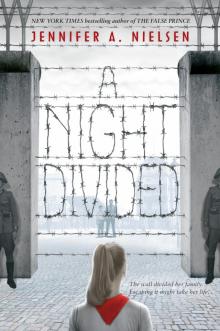 A Night Divided
A Night Divided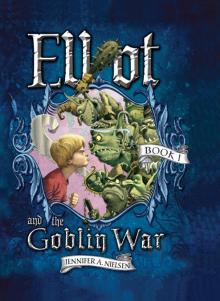 Elliot and the Goblin War
Elliot and the Goblin War Elliot and the Last Underworld War
Elliot and the Last Underworld War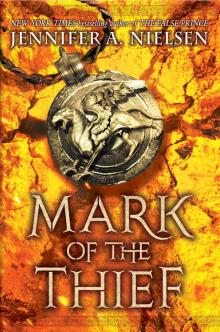 Mark of the Thief
Mark of the Thief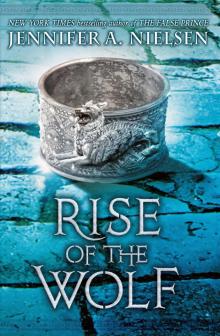 Rise of the Wolf
Rise of the Wolf Elliot and the Pixie Plot
Elliot and the Pixie Plot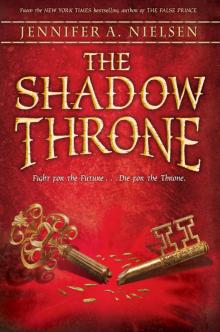 The Shadow Throne
The Shadow Throne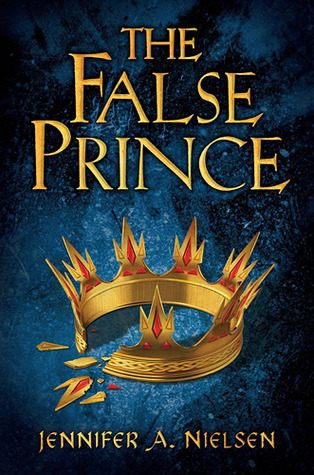 The False Prince
The False Prince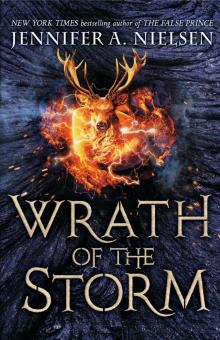 Wrath of the Storm
Wrath of the Storm Deadzone
Deadzone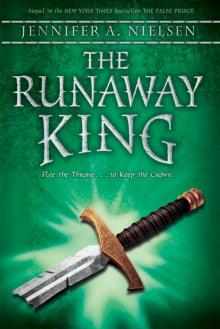 The Runaway King
The Runaway King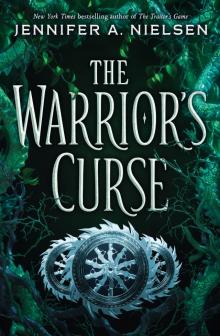 The Warrior's Curse
The Warrior's Curse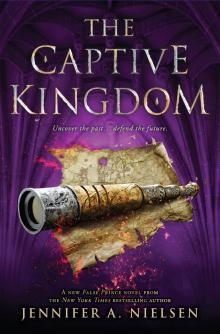 The Captive Kingdom
The Captive Kingdom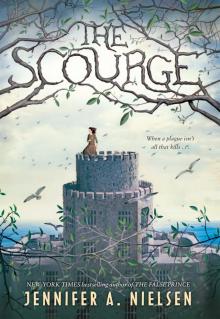 The Scourge
The Scourge The Deceiver's Heart
The Deceiver's Heart Resistance
Resistance